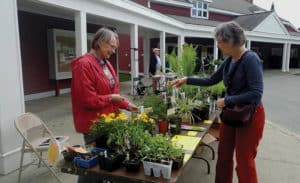By Nadie VanZandt, UVM Extension master gardener
Community-organized sales of donated perennial plants are popular and profitable fundraisers for many garden clubs and organizations. Regrettably, they can become “super-spreader” events if care is not used to avoid spreading diseases, pests or invasive species.

When planning a plant sale, organizers should adhere to safe practices guidelines for plant donations to ensure healthy plants and satisfied customers.
Basic hygiene and disease prevention strategies have been front and center in our daily lives this past year. But did you know that the lessons we have learned also are applicable to plants?
Like humans, plants are susceptible to fungal, viral or bacterial diseases. These diseases are transmitted through leaves, roots, soil or seeds. The simplest way to manage them is to take preventive measures. So, when it comes to the sales of donated plants, “Stop the Spread,” the motto used during the pandemic, also is relevant to the spread of plant diseases, pests or invasive species.
If your community group is planning a plant sale, consider adopting the following prevention guidelines to protect the environment, foster customer satisfaction and result in a successful event.
Instruct plant donors to disinfect all tools and containers used to dig, handle and pot plants. This is easily done with a 10 % solution of chlorine (one part chlorine to nine parts water).
Before potting any plants, gardeners should rinse the plant’s roots and carefully remove the roots of weeds that may be present. If possible, ask that all donations of rooted cuttings be propagated in sterile soil and disinfected pots.
Plants should not be taken from the wild but rather dug from home landscapes or gardens. Gardeners also should not donate any plants considered invasive. These include burning bush and Japanese barberry that were once sold as landscape plants but are now classified as “noxious weeds.” (For information on invasive plants, visit:
go.uvm.edu/vt-invasives-plants.)
Encourage gardeners to prepare for the plant sale early in the season if they plan to provide divisions of hostas, irises and other plants. Early divisions will result in healthier plants better suited to fight disease.
Before accepting any donated plant, thoroughly examine the leaves, stems and roots. Discard those that show any sign of disease, presence of insects, eggs or larvae.
Ensure that all plants are individually labeled, ideally with genus, species and cultivar. Think about using a simple sticker to validate that donors followed the safe practices guidelines. If a pest or disease is prevalent in your area, you may want to consider canceling your event.
As a buyer, do not purchase any plants that are not labeled or that you can’t confirm are not invasive. Ask the plant sale sponsors if they required donors to follow safe and hygienic practices when donating plants.
Before you buy, examine the plant stems for new growth and look for healthy leaves and root systems. Avoid plants that are root-bound, wilted or with any signs of insects, eggs or cocoons under their leaves. If possible, check the soil for fungus, signs of insects or their droppings.




